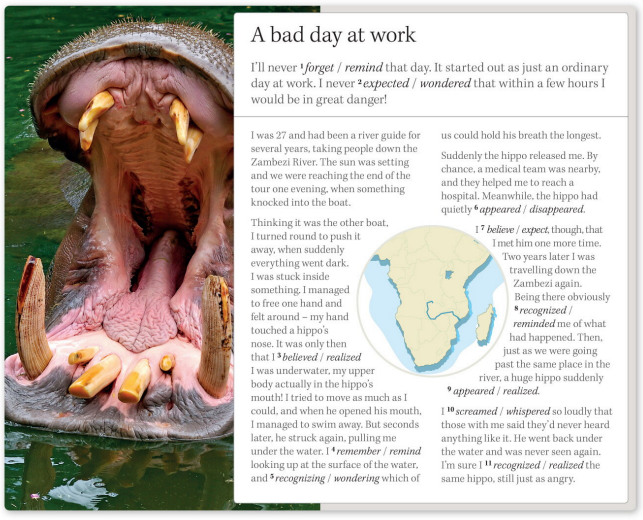Vocabulary & Reading describing past experiences
1. Look at the photo and the headline of the article and discuss the questions.
1. What do you consider to be a bad day at work?
So instead of work I am going to school. Even though I like my school and I like to work, but sometimes I hate my teachers or that subject and I just want to go home. But at the same time when I get home I want to go back to school.
2. How could a hippo be related to a bad day at work?
What do you mean? The hippo is the reason that this person had a terrible day at work. The hippo tried to eat the poor man. He could have just asked him for food not attack him and even drown him.
2. Read the magazine article. Were are your ideas close to what actually happened?
Sadly before I could answer this question, I have already read the article:)
3. Read the article again and choose the correct verbs.

• I’ll never forget that day. It started out as just an ordinary day at work. I never expected that within a few hours I would be in great danger!
• I managed to free one hand and felt around – my hand touched a hippo’s nose. It was only then that I realized I was underwater.
• I remember looking up at the surface of the water, and wondering which of us could his breath the longest.
• Meanwhile the hippo had quietly disappeared.
• I believe, though, that I met him one more time.
• Being there obviously reminded me of what had happened.
• Then, just as we were going past the same place in the river, a huge hippo suddenly appeared.
• I screamed so loudly that those with me said they’d never heard anything like it.
• I’m sure I recognized the same hippo, still just as angry.
4a. Complete the questions with the verbs in the box.
1. When did the writer realize that his head was inside a hippo? How do you think he felt?
2. Why do you think the writer remember so clearly what he was seeing and wondering about while he was underwater?
3. Do you believe the writer really remembered the same hippo two years later, or did it just remined him of the hippo that attacked him?
4. Did you expect the writer to return to being a river guide after what happened? Would you?
b. Discuss your answers with a partner.
Grammer & Speaking narrative forms
5. Work with a partner. Match verbs 1-5 to descriptions a-c.
1. I was 27 and 1had been a river guide for several years.
2. The sun 2was setting and we 3were reaching the end of the tour one evening, when something knocked into the boat.
3. …something 4knocked into the boat. Thinking it was the other boat, I 5turned round to push it away…
a Setting the background to the story: 2
b The main events in a story: 3
c An event that happened before the main events in the story: 1
6a. Read the Grammer focus box to check your ideas.
b. Add one more example of each form from the article on page 16 to the box.

7a. Complete the story with the correct form of the verbs in brackets.
A lucky escape
That reminds of another story I heard about a man who had a lucky escape. He had been at a barbecue restaurant on top of a mountain, and after the meal he decided not to take the cable car down with his friends, but to walk down instead. While he was looking for the path, he fell into a stream and broke his leg. Unable to move he tried to phone for help, but his mobile wasn’t working because he dropped it in the stream.
Knowing he was missing, teams of people were looking for him, but it was twenty-four days before they found him. Luckily he brought a bottle of barbecue sauce with him to the barbecue and he survived by drinking water mixed with the barbecue sauce.
C. Work with a partner. What could the man have said about his lucky escape a few years later?
“Always have water and food with him no matter where you go” – survived man
